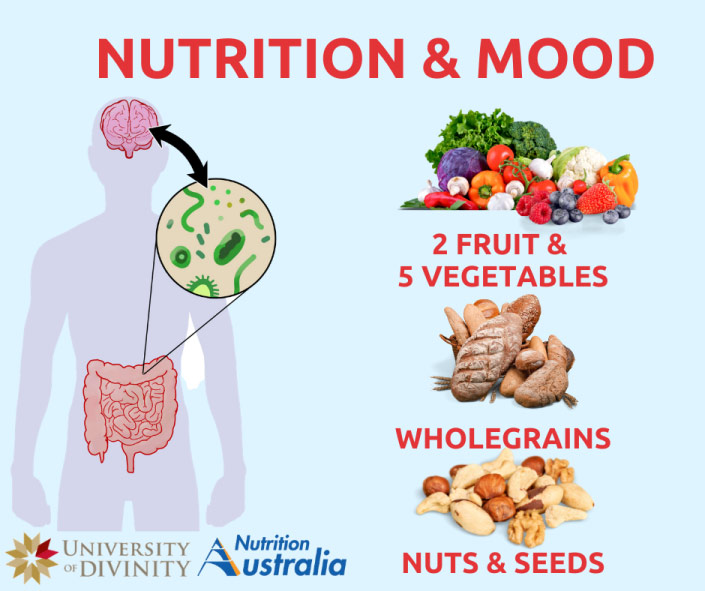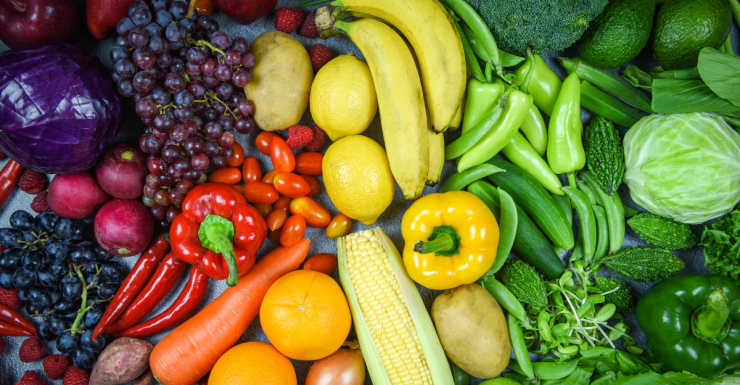Whilst adjusting to these unprecedented times is a challenge, eating nutritiously is something we can all do to help support our mental health. Growing research is finding our food choices significantly affect our mood. This link is no surprise – after all our brain is an organ like any other in our body, and functions best when we eat a balanced diet full of key nutrients from the core food groups. So how can a balanced diet have a positive impact on your mental health?
A key player in the relationship between our food and our brain is the gut. We are learning more and more about the relationship between the health of our gut and mental condition, including how it impacts mood, our concentration and our brain’s ability to learn and retain information. Growing evidence is finding our gut microbiome (made up of approximately 40 trillion live microbes, mainly bacteria) has an impact on stress, anxiety, concentration, behaviour and mood. A 2019 meta-analysis1 found depression and anxiety was associated with a less diverse microbiome composition. The analysis also suggested gut microbes may play a role in regulating stress and anxiety. In return, the brain impacts the gut, controlling aspects of digestion, such as secretion and motility. Essentially, research has found maintaining good gut health will promote good mental health!
So, what should I eat?
The best way to ensure we are giving our bodies the best food for mental health is to aim to eat a variety of unprocessed, whole foods from the core food groups.

Here are some helpful ways you can eat for your mood:
- Aim to eat 2 serves of fruit and 5 serves of vegetables each day. The best way to achieve this is to build half a plate with each meal and reach for a piece of fruit as a snack. To ensure you’re getting all the different nutrients fresh produce has to offer, aim to vary the colours of your meals and snacks. Try a rainbow salad of lettuce, carrot, tomato and cucumber. Eat a yellow banana one day, then try red strawberries the next.
- Don’t forget those healthy fats. Healthy fats, such as those found in nuts, seeds, fatty fish or olive oil play an important role in brain and nervous system function. An easy way for getting enough fats is to snack on a handful of nuts a day. Try walnuts, almonds or pumpkin seeds.
- Try to include some wholegrain, fibre-rich carbohydrates. Fibre is your gut microbiome’s favourite food. It is a major source of fuel for them and eating wholegrain, fibre foods such as wholemeal pasta, wholegrain bread or brown rice can ensure your gut microbes are happy and functioning properly.
1 Firth, J., Marx, W., Dash, S., Carney, R., Teasdale, S.B., … & Sarris, J. (2019). The Effects of Dietary Improvement on Symptoms of Depression and Anxiety: A Meta-Analaysis of Randomized Controlled Trials. Psychosomatic Medicine, 81(3), 265 – 280. doi: 10.1097/PSY.0000000000000673
https://www.ncbi.nlm.nih.gov/pmc/articles/PMC6455094/

The University of Divinity has partnered with Nutrition Australia in 2020 to provide a series of dietitian-approved advice that promotes healthy eating habits to help our students and staff make the most of learning opportunities.
Nutrition Australia is the nation’s peak expert advisory group on public health nutrition, advising and educating on healthy food choices to help Australians achieve optimal health through good nutrition.







Add comment